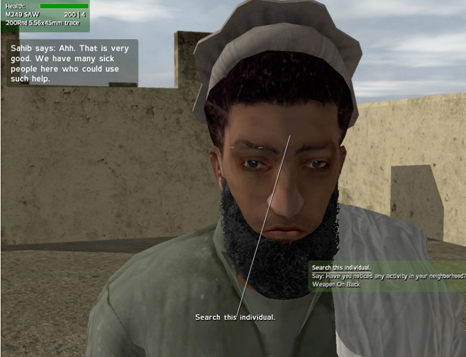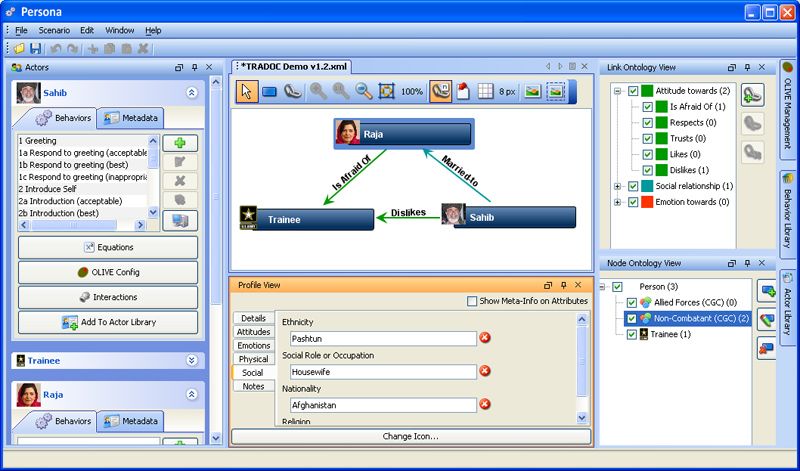CAATE
Training applications to teach Soldiers social and cultural skills
Culturally Aware Agents for Training Environments (CAATE)
Today’s Warfighters are increasingly engaging in peacekeeping missions, humanitarian missions, and stability and support operations. These missions often require junior leaders and Soldiers to interact and communicate effectively with people whose cultures, languages, lifestyles, and beliefs are very different from those found in the US. These missions require a variety of new skills that the US Army has not traditionally focused on, especially in the training arena.
Computer-based training in virtual environments has the potential to train Soldiers to rehearse missions with a sound knowledge of the relevant local cultural context. Existing computer simulations of culturally situated agents representing humans are either very limited in fidelity, making them unsuitable for training and rehearsal, or prohibitively expensive to develop and maintain as missions and needed skills change.

This figure shows a trainee interacting with a virtual Afghan in Persona.
“By using computer game technology and cutting-edge artificial intelligence (AI), we can create realistic, immersive, virtual training environments that every Soldier can have on his or her laptop. These training environments can teach social and cultural skills that have become tremendously important for mission success,”

Dr. Scott Neal Reilly,
Vice President, Decision Management Systems.
Under the CAATE effort, Charles River designed and prototyped a modeling toolkit called Persona™ for designing computer-controlled agents for cultural training applications. The approach uses graphical social network modeling technologies to develop models of socially interconnected agents and a graphical human behavior modeling tool for creating culturally-appropriate behaviors for the simulated agents. This figure shows Persona’s panels displaying agents, behavior, relationships, profiles, and more.
Charles River also developed a demonstration training application that uses socially dynamic agents in a virtual environment to teach simple social skills. One of the advantages of Persona is that it makes it easy, using a single user-facing tool, to create agents for several different virtual environments. We have used Persona to create virtual agents for a variety of simulation environments, including VBS2, OLIVE, and Half-Life 2.

The Benefit
“By using computer game technology and cutting-edge artificial intelligence (AI), we can create realistic, immersive, virtual training environments that every Soldier can have on his or her laptop. These training environments can teach social and cultural skills that have become tremendously important for mission success,” said Dr. Scott Neal Reilly, Vice President, Decision Management Systems. “For instance, Soldiers using training tools built with Persona can learn how to successfully interact with realistic, but virtual, residents of various countries in a completely safe, virtual environment.”
Contact us to learn more about CAATE and our other capabilities.
The views, opinions, and/or findings contained in this announcement are those of the author(s) and should not be construed as an official Department of the Army position, policy, or decision.
